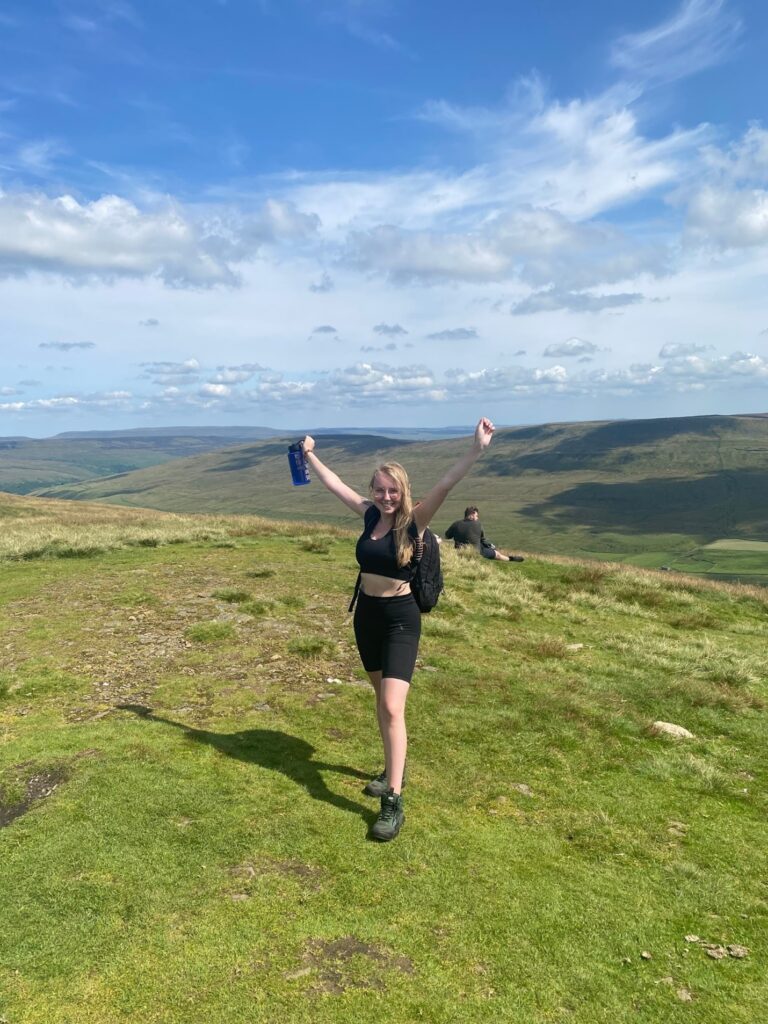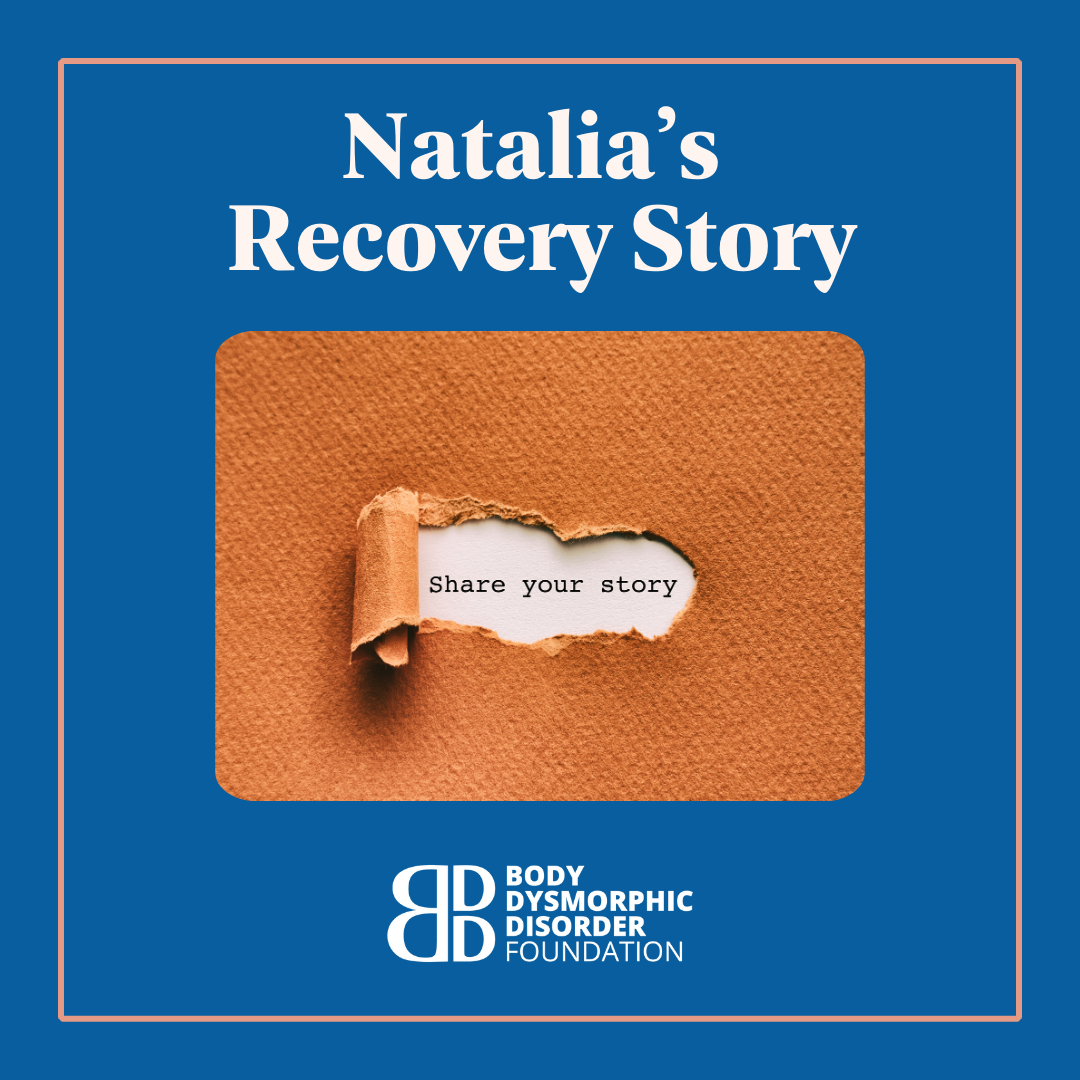“Recovery is not linear, but instead a process involving ups and downs and at times you may notice that the BDD is still trying to rear its head as you continue to work on yourself.”
My BDD began when I was around 14 with a preoccupation about my teeth. I remember having my photos taken, and my mum asking me to smile but being reluctant as I didn’t want to show my teeth. The defect was not visible to others and UK dentists refused to give me braces. My mum gave into my preoccupation and helped me get braces privately. I thought I fixed the issue but I then developed a new preoccupation with my buttocks. I fixated on the idea that if I had the buttocks that I considered desirable then I would be “lovable” and “good enough”. I was convinced that the ones I had made me “ugly” and “unattractive”.
In 2021 I experienced a breakdown of a relationship. At the same time, I discovered I had BDD. After learning I have BDD, the people I dated afterwards never understood my experience. I could not rely on my family for support, instead they exacerbated my symptoms. My safety seeking behaviours were out of control, I was constantly seeking reassurance from partners and comparing myself to other women. Engaging in those behaviours offered short term relief but it wasn’t long until I engaged in those behaviours again which fueled the BDD and made me feel worse.
I started my first course of CBT privately which was unsuccessful. In the sessions, we worked on the ‘cognitive’ component which wasn’t useful and involved a constant battle between me and the therapist, debating who was right and who was wrong – which was very counterproductive.
At the time I felt hopeless that things would ever get better and that I’d be able to maintain a healthy relationship. In desperation, I found the BDD Foundation, where I joined some online support groups with individuals who experienced similar thoughts and feelings. It was comforting to know I wasn’t alone, and I felt I was part of a community. I listened to other people’s stories but I was also able to share my own experiences of BDD, and felt heard, seen and understood. Coming to these groups, I felt I could be myself without any judgement. Individuals with BDD often experience intense shame, but in the support groups, I felt free from that shame and less concerned about how others perceived me.
Soon after that, I also started the Overcoming BDD Programme, which taught me various tools based on CBT techniques, to manage BDD. I was highly resistant to any treatment for a long time and found it hard to implement the tools I was learning.
I took a break from treatment and in 2023 I attended the BDD Foundation conference where I had an opportunity to learn more about BDD and services which offered treatment. I found the various talks very useful and especially the “Unfair to Compare” talk by Professor David Veale and Dr Rob Willson. I found that I could relate to this talk the most as I really struggled with comparison and was comparing myself constantly as part of my BDD. I took away some useful resources namely an inspiring book called “Trauma-Informed and Embodied Approaches to Body Dysmorphic Disorder” by Nicole Schnackenberg, which inspired me to start some trauma based therapy privately which I found extremely helpful.
I decided to give CBT another try and completed a full course for BDD through the NHS, focusing on changing my behaviours. Through the sessions, I learned about the cycle of BDD, identified my behaviours, and worked on reducing them gradually with behavioural experiments, which helped challenge negative predictions and ease my anxiety.
These were the same tools that were taught on the Foundation’s Overcoming BDD programme, and it was helpful to build on what I learnt on this programme. I found the Exposure Response Prevention (ERP) process valuable as it helped with gradually decreasing anxiety in situations that provoked it. The ERP helped me to re-engage in activities that I avoided due to my BDD and it helped me to reclaim my life. The process takes time, and involves repeated exposure until the anxiety has subsided. Behavioural experiments are helpful as they let you test your predictions and often reveal that the feared outcomes rarely occur.

I was able to get my life back, I became more engaged socially and joined a local hiking group. I am now better at shifting my attention and focusing externally when in social situations. I also met my partner through the hiking group. I have been focusing on building areas that do not involve appearance and instead I am focusing on developing interests and passions. I now volunteer for the BDD Foundation, both on the E-helpline and as a co-facilitator on the Overcoming BDD Programme.
Volunteering for the BDD foundation has been an extremely positive experience. It has given me a sense of purpose. Helping other people has also made me value myself for aspects outside of my appearance such as dedication, caring nature and kindness. Each time I volunteer, I come away with a sense of accomplishment that I’ve helped someone in need. Volunteering for the BDD Foundation has allowed me to focus more on my passions, interests, and meaningful areas of life.
Once I recognised that I had BDD, the BDD Foundation has been there for me each step of the way. From initially joining support groups which helped me feel less alone, to the Overcoming BDD Programme which introduced me to the tools I needed for recovery, to enabling me to be a greater part of the community by giving back as a passionate volunteer facilitator on the same programme I went through myself.
My final message is to persist and don’t give up – recovery is not linear, but instead a process involving ups and downs and at times you may notice that the BDD is still trying to rear its head as you continue to work on yourself. Recovery may require you to be intentional in consciously implementing the tools you’ve learnt in treatment.

